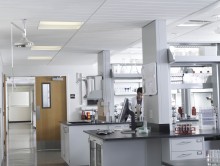- IMED offers this test in collaboration with the company Bioarray, located in the Business Park of the University Miguel Hernandez, who is the developer of this test.
- The test could avoid amniocentesis, an invasive procedure where the risk of abortion between 0.5 and 1 % is.
The department of gynecology and obstetrics at IMED Hospitales performs non-invasive screening test developed by the company BIOARRAY. The test being performed, by taking blood of the mother between 5 and 10 ml. Then is carried out massive sequencing from the free fetal DNA in the plasma , which allows us to identify cases of trisomy of chromosome 13 (Patau syndrome), 18 (Edwards syndrome), and 21 (Down's syndrome) This test was limited to pregnancies of twins, however, since the month of July this type of test is authorized by such pregnancies . Furthermore, it was found that the test is reliable from week 10 of pregnancy (confirmed by ultrasound) .
The test gives a high predictive value and effectiveness of 99.05 % of negative results , and more than 99 % for a positive result in all chromosomes studied ( 13 , 18 and 21 ) . In the event that the test is negative, we can discard these diseases, and thus avoid the amniocentesis , an invasive test in which a sample of amniotic fluid is extracted from the uterus of the mother by a needle trough the belly.
There are other alternative non- invasive test that can replace the amniocenecentesis , but none of them offers a validation rate so as high as Bioarray . The nuchal translucency ultrasound has a false positive rate of 5 % and a detection rate between 64-70 % . And biochemical screening of the blood of the mother has a false positive rate of 5 % and a detection rate between 65-81 % .
In Down syndrome, Edwards syndrome and Patau Syndrome
Down syndrome is a genetic condition that occurs in humans in about 1 in 700 births . The possibility of the development of the condition during pregnancy increases with the age of the mother from the age of 35 years. Patients suffering from Down syndrome have a peculiar face, most of them have mental retardation and may be associated with multiple organ complications . Similarly Patau and Edwards syndromes are clinical syndromes associated with severe perinatal mortality (in the period immediately before or after birth).


